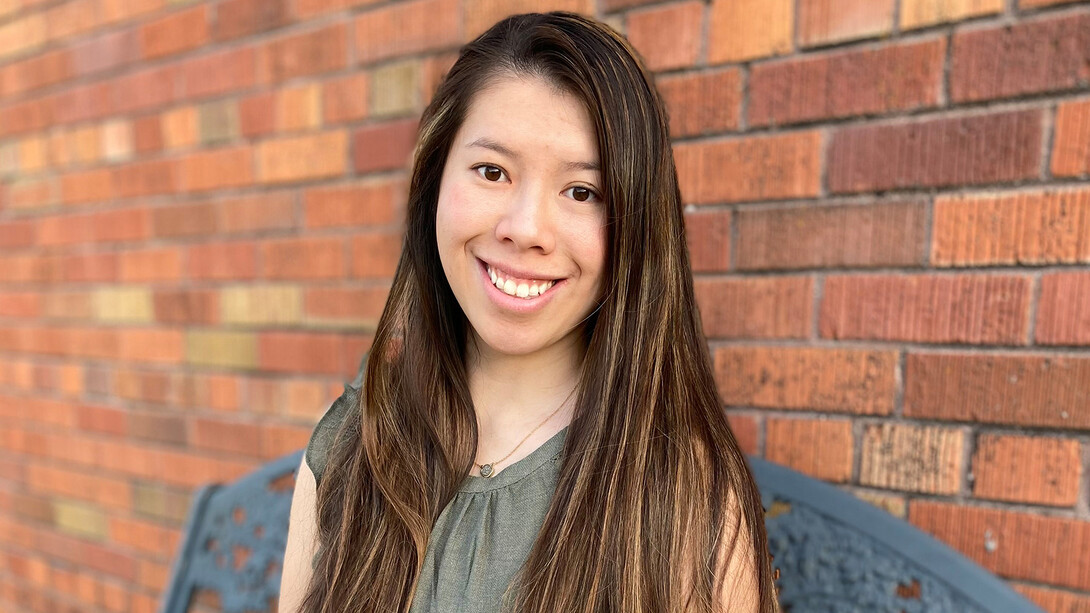
Editor's Note — This Q&A is part of a weekly conversation series that is celebrating Asian and Pacific Islander Desi American Heritage Month on the University of Nebraska–Lincoln's Medium page. The series will feature students who are making impacts on campus and look to maintain that momentum in future careers. Learn more about APIDA Heritage Month coverage in Nebraska Today.
his week, meet Emily Ritzdorf, a May graduate in architectural engineering from Howells, Nebraska. Through her involvement in the College of Engineering, she introduced K-12 kids to STEM, helping inspire the next generation of engineers.
Describe a bit about your personal and/or professional background.
I am originally from China and was adopted by my parents as a baby. Nebraska is the only place I have ever called home. I grew up in a small town of about 500 people where my mom was my second-grade teacher and my dad could walk to work at the local bank. My parents understood the value of education and have been fundamental factors to where I am at today. Growing up in a small rural town, I was not exposed to engineering until my senior year of high school. Math, science and art were the classes I was drawn to most, but it wasn’t until I visited with faculty that I knew I wanted to study engineering. I am a May 2021 graduate, majoring in architectural engineering with an emphasis in lighting/electrical and will return in the fall to finish my master’s degree. I plan on interning with Burns & McDonnell over the summer to apply the technical skills learned throughout my courses.
What is your role in the College of Engineering — and what do you love about what you are doing?
I am a member of the Architectural Engineering Student Leadership Advisory Committee, which acts as the connection point between the students, faculty and industry throughout the community. This has given me the opportunity to form relationships with professionals who have worked in the industry for years, as well as freshmen who are at the very beginnings of their engineering journey.
I am a former member of Engineering Ambassadors, which was a student organization that presented STEM topics from kindergarten to 12th grade. This allowed me a way to educate students from a young age to inspire their idea of what an engineer could do. As a small-town kid, I was not aware of the possibilities of a STEM major. I have been able to go back to small towns and help be an active change in the awareness of STEM fields. The reason I loved this was that when I returned to school a year later, they still remembered me and the activities we did together.
Why is your heritage meaningful to you and your family?
Celebrating one’s heritage is important to my family and me because although our blood isn’t the same, we can still honor the people and traditions from the past. This diversity of my upbringing has allowed me a unique outlook on life and realize that people are not that different from one another.
Is there anything you hope to accomplish in your lifetime?
I think throughout college, one topic that has become intriguing is to try to spread awareness of STEM fields. Providing opportunities for students who do not have the access to this information would be a goal of mine. I would like to support this idea by either someday starting a scholarship or being involved in programs that provide outreach.
What or who inspires/motivates you?
I don’t have a specific person that motivates me, but I would like to say it was the people and conversations I have had along the way that have continually provided the push I needed throughout the difficult times. Recalling compelling words from a high school coach, a conversation with a neighbor after church, a goodbye from a professor at the end of a semester, to notes written by friends have been the inspiration I have drawn from over the years.
What is your advice to other students looking to make an impact?
My advice would be that the little things can add up and make more of a difference than you think. There are endless opportunities to become involved and make an impact within a community. Surrounding yourself with individuals that have similar goals is a key to create the momentum needed, and it goes back to showing up and executing.
What advice can you give students pursuing engineering as a career?
Showing up. The ability to show up to class, to office hours, to student organizations, or events can be the key points to making those important connections with future coworkers, or employers. Technical skills are very important to becoming an engineer, however, learning to build relationships can help you go even farther in your career.







